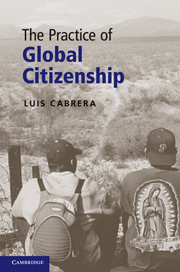Book contents
- Frontmatter
- Contents
- Preface
- Acknowledgments
- Introduction
- Part I Theoretical concerns
- Part II Global citizenship in practice
- 4 Minutemen and desert samaritans: citizenship practice in conflict
- 5 Mobile global citizens
- 6 Global citizen duties within less-affluent states
- Part III Advocacy and institutions
- Conclusion: the practice of global citizenship
- Appendix
- Works cited
- Index
4 - Minutemen and desert samaritans: citizenship practice in conflict
Published online by Cambridge University Press: 05 June 2012
- Frontmatter
- Contents
- Preface
- Acknowledgments
- Introduction
- Part I Theoretical concerns
- Part II Global citizenship in practice
- 4 Minutemen and desert samaritans: citizenship practice in conflict
- 5 Mobile global citizens
- 6 Global citizen duties within less-affluent states
- Part III Advocacy and institutions
- Conclusion: the practice of global citizenship
- Appendix
- Works cited
- Index
Summary
Douglas, Arizona: Tommy Bassett told the tale with relish. It had been in the spring of 2005, just before the initial Minuteman Project vigil. Bassett, a longtime Douglas, Arizona border activist and a founder of the Just Coffee fair-trade cooperative, had set up camp on the south side of the border with a group of recovering Mexican drug users enlisted to conduct humanitarian patrols as part of their rehabilitation. They watched in bemusement and with some apprehension as Minuteman leader Chris Simcox led his own volunteers in preparatory patrols at what were to be the main vigil sites across the barbed wire boundary. When night fell, a group of migrants who had received food and water at the Mexico camp decided to make their attempt. As Bassett recalled, the Minutemen took immediate notice.
We could hear them on their radios, and all of a sudden they were talking about seizing this group of migrants that was coming across. We decided we’d put a stop to that. So we split up into two groups and we met up between the Minutemen and the migrants on the Mexican side of the border. We started shining our flashlights on the migrants, driving them back. They started running back into our camp, thinking the Border Patrol was after them. The Minutemen, they don’t know what’s going on, until they figure out that migrants don’t use flashlights. We could hear Simcox and some of his people working it out on their radios. Finally, they got in their vehicles and drove away, and everybody (migrants) crossed after that. (Author interview, July 2005)
Bassett laughed – a booming, hoarse, explosion of glee instantly recognizable by Arizona border activists and in the coffee-growing communities of southern Mexico. The border is nothing if not a game of cat and mouse, he noted, and on that occasion the mice had gotten away.
Off Highway 286, south-central Arizona: Arizona Minuteman leaders Stacey O’Connell and David Jones told with equal delight the story of how they had turned the tables on migrant-rights activists. They reported being irked by constant surveillance from American Civil Liberties Union legal observers organized by Ray Ybarra, a Stanford University law student on an ACLU fellowship. O’Connell and Jones contended that the ACLU observer teams had repeatedly jammed Minuteman field radios by leaving their own radios on at the same frequencies. Such parallels are not uncommon in the high-stakes games played by civilian volunteers on opposing sides of the immigration divide. They are locked in a struggle to promote conflicting views about membership, belonging, and at root, citizen duty. The Minutemen see themselves as enacting a duty to protect their own compatriots from threats posed by unwanted outsiders. No More Deaths group members espouse a much more inclusive worldview. They see themselves as observing morally foundational, state-transcendent duties to protect vulnerable individuals, regardless of their citizen status. In line with the earlier discussion of “good-faith biases,” Minutemen see their actions as morally justifiable within a sovereign states system. No More Deaths members reject some of the norms inherent in such a system, including the state’s presumed right to unilaterally dictate the distribution of membership.
- Type
- Chapter
- Information
- The Practice of Global Citizenship , pp. 99 - 130Publisher: Cambridge University PressPrint publication year: 2010

